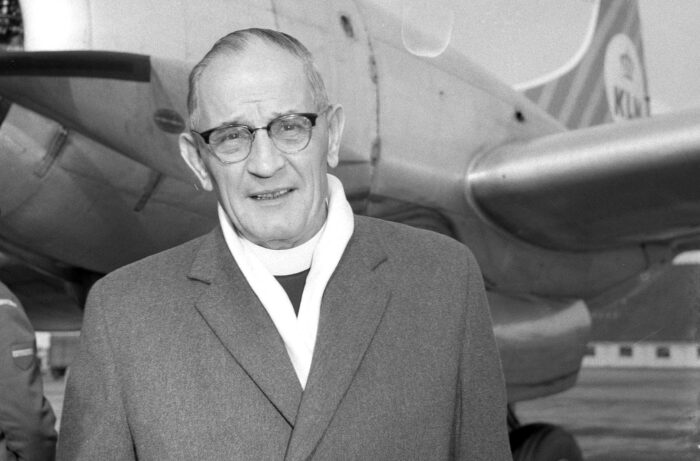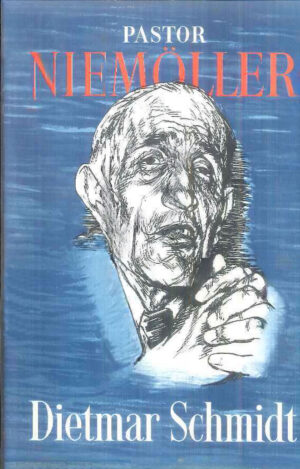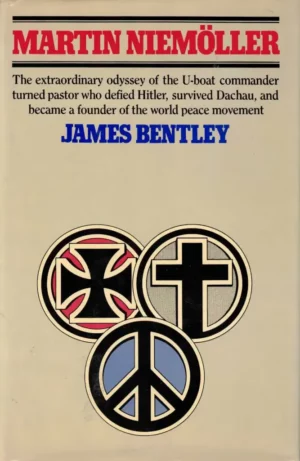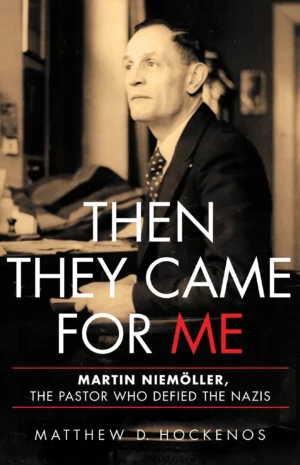Martin Niemöller, Scourge of Tyranny
First they came for the Germans, and I did not speak out—for I was not a German.
Then they came for the Palestinians, and I did not speak out—for I was not a Palestinian.
Then they came for the Holocaust revisionists, and I did not speak out—for I was not a Holocaust revisionist.
Then they came for me—and there was no one left to speak out for me.
This article will discuss the life and career of the man who produced the famous confession parodied above—Martin Niemöller.
Early Career
Martin Niemöller’s career began in the Imperial German Navy. After his initial training at the Flensburg-Mürwik Naval College, 18-year-old Niemöller became an officer-cadet and took the requisite oath of loyalty to the kaiser on May 7, 1910. When war broke out in August 1914, Niemöller was assistant torpedo officer on the Battleship Thüringen.[1]
Niemöller next served as navigator on several German U-boats during World War I. By the end of June 1918, Niemöller was assigned command of the Submarine UC67. Niemöller learned that Germany had surrendered to the Allies while on patrol as commander of the UC67. Niemöller later documented his experiences in the First World War in a book titled From U-Boat to Pulpit.[2]
Niemöller resigned from the German Navy and married his fiancée Else on Easter Sunday, 1919. After briefly working as a farmer, Niemöller enrolled as a theology student at the University of Münster. Niemöller worked at several jobs to support his growing family during the years he studied to become a pastor. Niemöller completed his final church examination at the beginning of May 1924, and was soon ordained as a pastor in the Church of the Redeemer in Münster.[3]
Niemöller worked the next seven years for the Westphalia Inner Mission. One part of Niemöller’s job was to coordinate the 49 youth and welfare organizations that existed in Westphalia, a task that kept Niemöller away from home every other day of the year. Niemöller learned much from this work and developed valuable abilities in organizing people and institutions. He left the Inner Mission to become the third pastor of the Parish of Dahlem.[4]

Martin and Else Niemöller and their six children moved into a pastor’s house in Dahlem the last week of June 1931. Niemöller voted National Socialist in 1933 in hopes of a stronger alliance between the church and state. Niemöller said:
Among many sections of our people the hope has sprung up that there will now be a new meeting between our nation and the Christian church, between our nation and God. And we hope from our hearts that through the movement which is at present developing in our church, obstacles will be swept away and the way made clear.[5]
Conflict with Hitler
Niemöller devoted the next several years to the tasks which were the essence of his calling—preaching and the salving of souls. In November 1932, church elections brought Niemöller into contact for the first time with the “German Christians”, an organization established only five months previously. The German Christians openly sought to subordinate Christianity and the Protestant churches to the National-Socialist regime.[6]
 Church elections resulted in Friedrich von Bodelschwingh becoming the first reich bishop, with Niemöller and another colleague named as Bodelschwingh’s assistants. However, Bodelschwingh resigned four weeks later when he became convinced that Hitler’s intention was to subordinate German churches to his supreme control.[7]
Church elections resulted in Friedrich von Bodelschwingh becoming the first reich bishop, with Niemöller and another colleague named as Bodelschwingh’s assistants. However, Bodelschwingh resigned four weeks later when he became convinced that Hitler’s intention was to subordinate German churches to his supreme control.[7]
New elections enabled the German Christians to gain control of the German churches. Three weeks later, Niemöller mailed a circular letter to all German pastors inviting them to join the Pastors’ Emergency Union. The response exceeded all expectations. By January 1934, 7,000 of the 15,000 pastors in Germany had joined the Union. Niemöller almost overnight became the mouthpiece of the German churches’ opposition to Hitler’s ambitions concerning the church.
Niemöller issued a directive to the members of the Emergency Union urging that they boycott a questionnaire which the government had circulated to all clergy on the subject of their racial ancestry. Niemöller said the distinction between an Aryan and a non-Aryan was meaningless to a Christian, for “here is neither Jew, nor Greek, but all are one in Jesus Christ.” Niemöller’s motive was to prevent the introduction of National-Socialist racial laws into the Protestant church.[8]
On January 25, 1934, Hitler summoned Niemöller and other leaders of the Protestant churches to a conference. Hermann Göring at the start of the conference read a transcript of a telephone conversation Niemöller had made earlier that morning. Niemöller explained to Hitler after Göring read the transcript that this telephone conversation had been a private one, and his secretary’s comment about extreme unction at the end had been made for the sole reason of ending the conversation. Niemöller said his work had no other objective than the welfare of the church, the state and the German people.[9]
 On his way out, Niemöller asked Göring when had it become customary in Germany to listen in on people’s private telephone conversations. Niemöller asked Göring:
On his way out, Niemöller asked Göring when had it become customary in Germany to listen in on people’s private telephone conversations. Niemöller asked Göring:
“And what led you to make the charge that the Emergency Union receives financial support from abroad?”
Göring said he would send Niemöller proof of his allegation. Gestapo men ransacked Niemöller’s rectory for incriminating material that same evening.[10]
Niemöller never deviated in his uncompromising position against the German Christians. His creation of the “Confessing Church” from his Pastors’ Emergency Union provided Niemöller a platform from which to denounce the German Christians in his sermons and speeches, in the press and in his private correspondence. In June 1937, most of the leaders of the Confessing Church were arrested by the Gestapo. Time was running out for Niemöller.[11]
Hitler’s Prisoner
Martin Niemöller was arrested on July 1, 1937 and brought to the secret-police headquarters in Alexanderplatz. He was not interrogated, but brought to Moabit Prison, where he occupied a small cell. Niemöller had to wait more than seven months while evidence was gathered to prosecute him at his trial.[12]
Niemöller’s trial opened on February 7, 1938. The defense emphasized the pastor’s patriotism and personal loyalty to the state. Niemöller recounted his war service, and described himself as a completely unpolitical man who had no personal animosity against the National Socialists. Niemöller insisted that obedience to God’s word governed his actions and took precedence over any other obligation. Numerous defense witnesses also testified effectively on Niemöller’s behalf. [13]
 It became clear during the trial that the prosecution had a weak case. On March 2, 1938, the judge found Niemöller guilty only of misusing the pulpit, and sentenced him to seven months in prison and a fine of 1,500 marks. Since Niemöller had already served seven months in jail, the prison sentence was waived and Niemöller was free to go home.[14]
It became clear during the trial that the prosecution had a weak case. On March 2, 1938, the judge found Niemöller guilty only of misusing the pulpit, and sentenced him to seven months in prison and a fine of 1,500 marks. Since Niemöller had already served seven months in jail, the prison sentence was waived and Niemöller was free to go home.[14]
However, Hitler ordered Niemöller placed in “protective custody” in Sachsenhausen Concentration Camp, where Niemöller was kept most of the time in solitary confinement. Niemöller’s acquittal, re-arrest and incarceration in Sachsenhausen produced an international scandal. U.S. Protestants regarded Niemöller as a hero of the faith, while reporters and journalists described Niemöller as a heroic figure in the struggle against Nazism.[15]
On July 11, 1941, Niemöller was transferred from Sachsenhausen in the Protestant north to the Dachau Concentration Camp in the Catholic south, where he was housed with three Catholic priests: Johannes Neuhäusler, Nikolaus Jansen and Michael Höck. Daily contact and conversation with these and other clerics in Dachau revived Niemöller. The move to Dachau also increased Niemöller’s popularity abroad. Numerous books exalting his piety and courage were published in the United States in the early 1940s, making Niemöller a world-famous person.[16]
Conflict with the Allies
Martin Niemöller was flown to Naples after the war, and then as a special prisoner was flown to France to spend a couple of days in an internment camp near Versailles. He next was flown to Frankfurt and was then taken to an interrogation center in Wiesbaden. It was now mid-June 1945, and the occupying powers were proposing to confine him in Wiesbaden. Niemöller went on a hunger strike to gain his freedom. Four days later, Niemöller was released by the Allies and finally made it home on June 24, 1945.[17] Else told her husband that the eight weeks between his release from German custody and their reunion, during which she waited every hour for his return, were “worse than the whole eight years before.”[18]
The American infatuation with Niemöller was severely tested by an interview he gave in Naples on June 5, 1945 to dozens of British and American war correspondents. Niemöller said his objections to Nazism were religious and not political, which is why he had offered his services to the German Navy when World War II broke out. Niemöller said that honest Germans did not feel responsible for the German concentration camps. Niemöller further said that the German people were ill suited to live under a Western form of democracy; indeed, in many ways Germans preferred authoritarian rule.[19]
Niemöller faced harsh criticism from Eleanor Roosevelt after this interview. The former first lady wrote, “Pastor Niemöller sounds to me like a gentleman who believes in the German doctrine of the superiority of race” and described his Naples interview as sounding “almost like a speech by Mr. Hitler.” Niemöller later wrote that Eleanor Roosevelt and her friends were investigating and highlighting his past, saying that he had been “an anti-Semite, a militarist and even a Nazi!”[20]
Niemöller became exasperated by repeated assaults on his honor by the Allies. He yearned for the life of a simple pastor. Niemöller wrote to an American friend:[21]
“Else and I are rather tired of the whole thing, and I am thinking earnestly of leaving Germany for good and of taking a small congregation in England or in your country. You see, there is not much left of the old ‘fighting pastor,’ at least of my old resistance.”
Origin of Famous Confession
Martin Niemöller is internationally and historically famous for the following confession:
First they came for the Communists, and I did not speak out—for I was not a Communist.
Then they came for the trade unionists, and I did not speak out—for I was not a trade unionist.
Then they came for the Jews, and I did not speak out—for I was not a Jew.
Then they came for me—and there was no one left to speak out for me.[22]
The origin of this “Niemöller’s Confession” lies in speeches Niemöller made in Germany in 1946, where he admitted his own complacency in Germany’s crimes. Like most Germans, Niemöller did not realize that he had been lied to by the Allies concerning the “Holocaust” and the origins of World War II.
Historian Matthew Hockenos writes concerning Niemöller’s famous confession:[23]
“There is no hint of the poetic and rhythmical recitation of groups and actions that makes the famous confession so captivating, but its basic structure is apparent. In a January address in Frankfurt, for example, he lists Communists, the incurably ill, and Jews as groups the Nazis assailed while he and other Germans passively watched with disinterest, if not silent approval. In another speech from this period, he added to his list Jehovah’s Witnesses, who had been attacked by the Nazis because of their international connections, their refusal to serve in the military, and their emphasis on the Old Testament.“
Historians have frequently speculated that Niemöller gave voice to his famous confession during his U.S. tour from December 1946 to late April 1947. However, this is not the case. Niemöller traveled to America to solicit American aid to alleviate the harsh conditions in Germany after the war. He did not travel to the United States to highlight his nor other Germans’ failure to resist Hitler’s attacks on communists, Jews and other people. That message was not apposite for American audiences in the immediate postwar years.[24]
Helping Germans
Martin Niemöller opposed Allied denazification programs from the moment the policy was launched in 1945 to its demise in 1948. When asked in December 1945 what he thought was the most-serious problem facing the German churches, Niemöller mentioned the tyrannical denazification policies that had resulted, in the American Zone alone, in the arrest and internment of some 117,000 Germans who had been members of Nazi organizations. Niemöller in early 1946 joined other church leaders in sending a declaration to the American Military Government criticizing the denazification process.[25]
Historian Steven Remy writes concerning Niemöller’s opposition to denazification:[26]
“In early 1948, […] Martin Niemoeller went so far as to insist that Protestants stop assisting the prosecution and forbade clergy in Hesse-Nassau from ‘justify[ing] this scandal any longer by doing any work in connection with denazification.’“
Niemöller was also a strong critic of the Allied-run postwar war-crimes trials in Germany. Along with four other leading German clergymen, Niemöller sent a long letter to U.S. Gen. Lucius Clay denouncing the International Military Tribunal (IMT). The signatories argued that the defense attorneys had been hobbled at the IMT, witnesses had been “interrogated under the duress of extradition to Eastern states,” international law was being applied only to the vanquished, and there was no court of appeal. Niemöller also vigorously protested the unfairness of other American-run postwar trials in Germany.[27]
Niemöller and his family suffered extreme hardships after the war. Niemöller told his friend Pastor Ewart Turner that if things didn’t improve, “I should prefer to be back in my cell Number 31 at Dachau.” Niemöller blamed “the followers of the Morgenthau Plan” who had moved their “headquarters from Washington to the American Zone.”[28]
During his American speaking tour, Niemöller told American audiences that Germans were receiving no better than “the lowest ration ever heard of in a Nazi concentration camp.”[29] Although Niemöller raised more money than expected from his American tour, he was disappointed in its outcome because he was not able to improve U.S. occupation policies in Germany. Starvation conditions continued in Germany after Niemöller’s American tour.[30]
Conclusion
Martin Niemöller is remembered today as the pastor who resisted the Nazis and made the famous postwar confession, “First they came for the Communists…” Niemöller’s reputation is not without merit. Niemöller defied Hitler’s attempt to control the Protestant church, and he was imprisoned for almost eight years on Hitler’s personal orders.[31]
But Niemöller should also be remembered as an effective orator, a skilled administrator and a tireless worker for whatever cause he was working for at a given time. He dedicated his later life to the service of justice, peace, and love for one’s neighbor, and encouraged people to speak out whenever other human beings were being persecuted.[32]
Niemöller was also a patriotic German who did what he thought was best for Germany. He volunteered to fight in the German Navy during World War II even though Hitler had imprisoned him in Sachsenhausen and Dachau. Niemöller also vigorously opposed Allied denazification policies, protested the injustice of the Allied-run postwar trials in Germany, and sought to alleviate the draconian deprivations imposed by the Allies on Germans after World War II.
Many people have criticized Niemöller for his German patriotism; other people have criticized him for his confession, which was used by Allied propagandists to demonize Germans. In regard to his famous confession, Niemöller did not realize that he had been deceived by the Allies concerning the so-called Holocaust and the origins of World War II. Like most Germans, Niemöller was a victim of the supreme Allied atrocity campaign, the one designed to induce guilt in Germans for the acts, actual, alleged, and mischaracterized, of their state before and during the war.[33]
Endnotes
| [1] | Bentley, James, Martin Niemöller 1892-1984, New York: The Free Press, 1984, p. 8. |
| [2] | Ibid., pp. 8-9. |
| [3] | Ibid., pp. 20-31. |
| [4] | Ibid., pp. 35-36. |
| [5] | Ibid., pp. 37, 41. |
| [6] | Schmidt, Dietmar, Pastor Niemöller, Garden City, N.Y.: Doubleday & Company, Inc., 1959, pp. 83-85. |
| [7] | Ibid., pp. 87-88. |
| [8] | Ibid., pp. 89-90. |
| [9] | Ibid., pp. 91-93. |
| [10] | Ibid., p. 94. |
| [11] | Ibid., pp. 97, 99-100. |
| [12] | Bentley, James, Martin Niemöller 1892-1984, New York: The Free Press, 1984, pp. 130-138. |
| [13] | Ibid., pp. 138-139. |
| [14] | Hockenos, Matthew D., Then They Came for Me: Martin Niemöller, the Pastor Who Defied the Nazis, New York: Basic Books, p. 135. |
| [15] | Ibid., pp. 136, 142. |
| [16] | Ibid., pp. 148, 153. |
| [17] | Bentley, James, Martin Niemöller 1892-1984, New York: The Free Press, 1984, pp. 156-158. |
| [18] | Hockenos, Matthew D., Then They Came for Me: Martin Niemöller, the Pastor Who Defied the Nazis, New York: Basic Books, p.168. |
| [19] | Ibid., pp. 162-163. |
| [20] | Ibid., pp. 174, 212. |
| [21] | Ibid., p. 212. |
| [22] | Ibid., p. 1. |
| [23] | Ibid., pp. 179-180. |
| [24] | Ibid., pp. 200-201. |
| [25] | Ibid., pp. 182-183. |
| [26] | Remy, Steven P., The Malmedy Massacre: The War Crimes Trial Controversy, Cambridge, Mass.: Harvard University Press, 2017, p. 186. |
| [27] | Ibid., pp. 203, 258. |
| [28] | Hockenos, Matthew D., Then They Came for Me: Martin Niemöller, the Pastor Who Defied the Nazis, New York: Basic Books, pp. 204, 212. |
| [29] | Ibid., p. 204. |
| [30] | Ibid., p. 209. |
| [31] | Ibid., p. 263. |
| [32] | Ibid., pp. 263-265. |
| [33] | Tedor, Richard, Hitler’s Revolution, Chicago: 2013, p. 263. |
Bibliographic information about this document: Inconvenient History, 2019, Vol. 11, No. 4
Other contributors to this document: n/a
Editor’s comments: n/a
